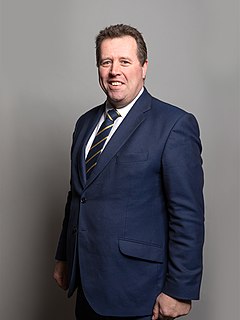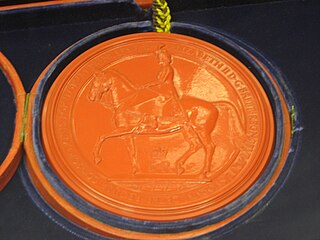A head of state is the public persona who officially embodies a state in its unity and legitimacy. Depending on the country's form of government and separation of powers, the head of state may be a ceremonial figurehead or concurrently the head of government and more.

An oath of office is an oath or affirmation a person takes before assuming the duties of an office, usually a position in government or within a religious body, although such oaths are sometimes required of officers of other organizations. Such oaths are often required by the laws of the state, religious body, or other organization before the person may actually exercise the powers of the office or organization. It may be administered at an inauguration, coronation, enthronement, or other ceremony connected with the taking up of office itself, or it may be administered privately. In some cases it may be administered privately and then repeated during a public ceremony.

A prime minister,premier or chief of cabinet is the head of the cabinet and the leader of the ministers in the executive branch of government, often in a parliamentary or semi-presidential system. Under those systems, a prime minister is not the head of state, but rather the head of government, serving under either a monarch in a democratic constitutional monarchy or under a president in a republican form of government.

President is a common title for the head of state in most republics. The president of a nation is, generally speaking, the head of the government and the fundamental leader of the country or the ceremonial head of state.

The Privy Council of the United Kingdom, officially Her Majesty's Most Honourable Privy Council, or known simply as the Privy Council (PC), is a formal body of advisers to the Sovereign of the United Kingdom. Its membership mainly comprises senior politicians who are current or former members of either the House of Commons or the House of Lords.
The head of government is either the highest or the second-highest official in the executive branch of a sovereign state, a federated state, or a self-governing colony, autonomous region, or other government who often presides over a cabinet, a group of ministers or secretaries who lead executive departments. In diplomacy, "head of government" is differentiated from "head of state" although in many countries, for example the United States, they are the same person.
A style of office or form/manner of address, is an official or legally recognized form of address for a person or other entity, and may often be used in conjunction with a personal title. A style, by tradition or law, precedes a reference to a person who holds a post or political office, and is sometimes used to refer to the office itself. An honorific can also be awarded to an individual in a personal capacity. Such styles are particularly associated with monarchies, where they may be used by a wife of an office holder or of a prince of the blood, for the duration of their marriage. They are also almost universally used for presidents in republics and in many countries for members of legislative bodies, higher-ranking judges and senior constitutional office holders. Leading religious figures also have styles.

The Lord President of the Council is the fourth of the Great Officers of State of the United Kingdom, ranking below the Lord High Treasurer but above the Lord Keeper of the Privy Seal. The Lord President usually attends and is responsible for presiding over meetings of the Privy Council of the United Kingdom, presenting business for the monarch's approval. In the modern era, the holder is by convention always a member of one of the Houses of Parliament of the United Kingdom, and the office is normally a Cabinet post.

A speech from the throne, or throne speech, is an event in certain monarchies in which the reigning sovereign, or a representative thereof, reads a prepared speech to members of the nation's legislature when a session is opened, outlining the government's agenda and focus for the forthcoming session, or in some cases closed. When a session is opened, the address sets forth the government’s priorities with respect to its legislative agenda, for which the cooperation of the legislature is sought. The speech is often accompanied with formal ceremony and is often held annually, although in some places it may occur more or less frequently, whenever a new session of the legislature is opened.

The Lord Privy Seal is the fifth of the Great Officers of State in the United Kingdom, ranking beneath the Lord President of the Council and above the Lord Great Chamberlain. Originally, its holder was responsible for the monarch's personal (privy) seal until the use of such a seal became obsolete. Though one of the oldest offices in European governments, it has no particular function today because the use of a privy seal has been obsolete for centuries; it may be regarded as a traditional sinecure, but today, the holder of the office is invariably given a seat in the Cabinet of the United Kingdom, and is sometimes referred to as a Minister without Portfolio.

The lord chancellor, formally the lord high chancellor of Great Britain, is the highest-ranking among the Great Officers of State in Scotland and England, in the United Kingdom, nominally outranking the prime minister. The lord chancellor is appointed by the sovereign on the advice of the prime minister. Prior to their Union into the Kingdom of Great Britain, there were separate lord chancellors for the Kingdom of England and the Kingdom of Scotland; there were lord chancellors of Ireland until 1922.
The title keeper of the seals or equivalent is used in several contexts, denoting the person entitled to keep and authorize use of the great seal of a given country. The title may or may not be linked to a particular cabinet or ministerial office. This is most often the case today, but in the past the role was often a distinct and important job.

A privy seal refers to the personal seal of a reigning monarch, used for the purpose of authenticating official documents of a much more personal nature. This is in contrast with that of a great seal, which is used for documents of greater importance.

The Great Seal of the Realm or Great Seal of the United Kingdom is a seal that is used to symbolise the Sovereign's approval of state documents.

The King-in-Council or the Queen-in-Council, depending on the gender of the reigning monarch, is a constitutional term in a number of states. In a general sense, it would mean the monarch exercising executive authority, usually in the form of approving orders, in the presence of the country's executive council.
The Registrar General of Canada is responsible for registering all letters patent, commissions, instruments, proclamations, and any other documents that may, from time to time, be issued under the Great Seal of Canada or the Privy Seal of Canada. The current Registrar General is François-Philippe Champagne.
An executive council is a constitutional organ found in a number of Commonwealth countries, where it exercises executive power and (notionally) advises the governor, governor-general, or lieutenant governor, and will typically enact decisions through an Order in Council. In several Commonwealth countries, the executive council is usually referred to as the cabinet. However, the use of the word cabinet as a synonym for the executive council is not universally practised throughout the Commonwealth of Nations, with some Commonwealth countries using the term cabinet to refer to a distinct group of high-ranking officials.
The Honourable or The Honorable is an honorific style that is used as a prefix before the names or titles of certain people, usually with official governmental or diplomatic positions.

In the United Kingdom, the Great Officers of State are traditional ministers of the Crown who either inherit their positions or are appointed to exercise certain largely ceremonial functions or to operate as members of the government. Separate Great Officers exist for England and Wales, Scotland, and formerly for Ireland, though some exist for Great Britain and the United Kingdom as a whole.
The British Certificate of Travel is an international travel document and a type of Home Office travel document issued by the UK Home Office to non-citizen residents of United Kingdom who are unable to obtain a national passport or other conventional travel documents. Until 17 March 2008, the Certificate of Travel was called a Certificate of Identity. It is usually valid for five years, or if the holder only has temporary permission to stay in the United Kingdom, the validity will be identical to the length of stay permitted.











